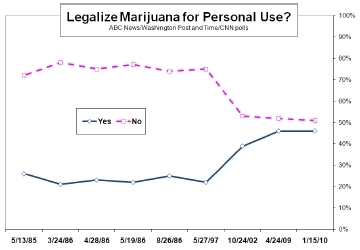At least seven heroin users have died from dope contaminated with anthrax in Scotland, and one in Germany. Harm reductionists and public health experts are demanding that government respond with more than "quit using."
Will the second time be the charm in South Dakota? Four years ago, a medical marijuana initiative there lost by four points. Now, advocates are ready to try again, and they think they can go over the top this time.
Sen. Jim Webb's (D-VA) National Criminal Justice Commission Act of 2009 has passed the Senate Judiciary Committee. If enacted, it would provide for the first comprehensive review of criminal justice policies in decades.
It was a relatively quiet week in Mexico's drug wars this week. Only about 15 people a day were killed.
The statehouses are humming and marijuana-related bills are coming fast and furious. Here's a glance at a few introduced in recent days.
Motherhood, apple pie, and... medical marijuana? A new ABC News/Washington Post poll finds that acceptance of medical marijuana is approaching near unanimity -- and support for legalization is rising, too. Politicians, take heed!
Seven years ago, Seattle residents voted to make marijuana offenses the lowest law enforcement priority. Now, the newly elected city prosecutor agrees with them. He says he will not prosecute simple pot possession cases.
And now there are 14 -- medical marijuana states, that is. The Garden State joined the list this week, although under the restrictive terms of the new law, the only pot gardens there will be in a handful of dispensaries.
The Washington state marijuana decrim and legalization bills were killed in committee this week. That means it will be up to the voters to legalize pot in November through an initiative -- if organizers can come up with enough signatures in time.
Given rising gang problems surrounding the hash trade in Copenhagen, Danes can be forgiven for yearning for the good old days of Pusher Street, where hash was slung relatively peacefully. Now, the Copenhagen city council wants to experiment with cannabis stores, but that seems unlikely to fly with the Conservative national government.
Apply for an internship at DRCNet and you could spend a semester fighting the good fight!
European heroin users are on high alert as the death toll rises from heroin tainted with anthrax. At least eight people have died -- seven in Scotland and one in Germany -- since early December, and another 14 Scottish heroin users have been hospitalized after being diagnosed with anthrax. Meanwhile, drug reform and drug user activists are reporting a cluster of nine suspicious heroin-related deaths in Coimbra, Portugal, although it is unclear at this point whether they are linked to anthrax-tainted heroin.

anthrax spores
The Scottish government has responded by urging heroin users to stop using and to seek drug treatment. That advice has not gone over well with drug users and public health and harm reduction advocates, who are demanding an emergency public health response.
The first four Scottish deaths were in Glasgow, but after one person died in Tayside and one in the Forth Valley earlier this month, Health Protection Scotland epidemiologist Dr. Colin Ramsay said: "The death of this patient in NHS Forth Valley indicates further geographical spread of the cases, meaning that heroin users all across Scotland need to be aware of the risks of a potentially contaminated supply. I would urge all users to stop using heroin immediately and contact local drug support services for help in stopping. If any heroin users do notice signs of infection, for example marked redness and swelling around an injection site or other signs of serious infection such as a high fever, they should seek urgent medical advice."
The French government has also reacted, with the General Directorate for Health issuing a statement Tuesday warning that contaminated heroin may be circulating in France and other European countries. Noting the rising death toll, the statement said "the likeliest source is heroin contaminated by anthrax spores."
Heroin users should be alert, the French statement said, because heroin contaminated with anthrax is indistinguishable from other heroin. "There is no outward sign or color enabling the user to tell whether the heroin has been contaminated by anthrax, and contaminated heroin dissolves or is used in the same way as uncontaminated heroin," it said.
Anthrax is a potentially lethal bacterium that exists naturally in the soil and can also occur among cattle. It is also a potential bio-terror weapon.
The vast majority of heroin consumed in Europe comes from Afghanistan, and while so far evidence is lacking, speculation is that anthrax spores may have been present in bone meal, an animal product sometimes used as a cutting agent. Another possibility is that containers used in the heroin production process were contaminated with anthrax spores. And, given fears that Al Qaeda and its Taliban allies could resort to biological warfare against the West and given the Taliban's role in the Afghan opium and heroin trade, a bio-attack cannot be completely ruled out.
"The anthrax-infected heroin hasn't decreased use, whether people are injecting it or chasing [smoking] it," said Tam Miller, chair of Chemical Reaction, an Edinburgh drug user group, and a member of INPUD (the International Network of People who Use Drugs). "People are scared -- you can be sure of that -- but I think they're more afraid of withdrawing. The Scottish government's advice was for people to stop using heroin, but that won't happen."
Instead, Miller said, heroin users are doing what they can to protect themselves. "Users feel there's not much they can do personally and, as usual, they feel isolated," he said. "A lot are looking up the effects on anthrax on the net and passing on information to people with no internet access. We think the powers that be should put out information on how to spot signs if someone has been in contact with access. Basically, mate, the Scottish government wants little to do with it."
The Scottish government's response so far has drawn a harsh rebuke from the United Kingdom's harm reduction and public health community. In a Tuesday letter to the Scottish government, the International Harm Reduction Association, the drug think tank Release, the Transform Drug Policy Foundation, the UK Harm Reduction Alliance, and individual public health experts called on the government to put in place an emergency public health plan to deal with the crisis.
The letter said the government's advice to heroin users to stop using and enter treatment was "reckless in light of the fact that waiting times in Scotland for opiate substitute treatment (OST) are the longest in the UK. Many of those accessing services are informed that it is a condition of their treatment to engage with the service for a minimum period of time, before they will be entitled to a prescription offering an alternative substitute medication, usually methadone. In some areas of Scotland we have been informed that waiting times for OST can be up to 12 months."
[There is another potential issue with methadone, as well. The antibiotic drug Cipro, used to treat anthrax, interacts with methadone, leading to the possibility of methadone overdoses.]
Given the reality of treatment shortages and delays, it is "unacceptable" for the Scottish government to just tell users to stop or to go to treatment that isn't there, the letter said. "It is clear that this kind of approach can only lead to the death of more vulnerable people."
Instead, the Scottish government must immediately implement a public health plan that includes rapid access and low-threshold prescribing of alternatives to street heroin, the letter-writers advised. They recommended prescribing dihydrocodeine, a synthetic opiate approximately twice as strong as codeine. It is sold in the US under brand names including Panlor, Paracodin, and Synalgos.
"Such an approach will go some way to prevent any more loss of life and will provide greater protection to the public as a whole," the letter said. "Failure to adopt such a policy would mean that the Scottish state would be failing in its duty to its citizens."
Joep Oomen of the European Coalition for Just and Effective Drug Policies (ENCOD) had another suggestion. "The only decent reaction to this kind of episode is to immediately open facilities where people can test their heroin and where they can use in safe conditions, supervised by people who can help if anything goes wrong," he said.
"Hopefully, in the longer term, because of these incidents, authorities will start to see the need for introducing heroin maintenance programs, not as a trial for a limited group of people, but as a permanent service for all those who cannot abstain from heroin for a longer period of time," he added.
Ultimately, said Oomen, prohibition is the problem. "Adulteration is a practice that belongs to the illegal market," he said. "It happens because the people who control the heroin market have no interest at all in the health of their customers."
Dr. Sharon Stancliff of the US Harm Reduction Coalition agreed with her colleagues' assessment of the Scottish government's response. "Telling people to stop is not useful information," she said. "Maybe some occasional users will have a glass of wine instead, but if people are sick and treatment is limited, telling people that heroin is bad for them isn't going to have much impact," she explained.
"At this point, the European harm reduction people should be getting the word out, and the medical people over there need to be on the alert," she added.
Stancliff said she had seen no sign of heroin contaminated with anthrax on this side of the Atlantic, but she was worried. "I hope the DEA is out there buying heroin to see what's in it," she said. "If there is any hint of it here, physicians should be alerted by the Centers for Disease Control as they were with levamisole-tainted cocaine."
If the anthrax-contaminated heroin is coming from Afghanistan, as most heroin consumed in Europe does, US heroin users may catch a break. Most heroin consumed here is of Mexican or Colombian provenance.
But on the other side of the Atlantic, adulterated heroin is killing drug users.
back to top
In 2006, voters in South Dakota become the first -- and the only -- in the nation to reject a state initiative legalizing medical marijuana, defeating it by a margin of 52% to 48%. This year, they will have a chance to reconsider. The South Dakota Coalition for Compassion announced this week it has gathered enough signatures to put its medical marijuana initiative on the November ballot.

coalition banner
Advocates need 16,776 valid signatures of registered voters to qualify for the ballot. The coalition says it has collected more than 30,000 signatures, far more than what is generally considered necessary to make up for the inevitable invalid signatures.
The coalition had planned to turn the signatures in to the South Dakota secretary of state Wednesday, but icy highways forced a change of plans. Now, organizers will make the 200-mile trip from Sioux Falls to the state capital in Pierre Monday, providing roads are passable.
The initiative, which was crafted with the help of the Marijuana Policy Project in Washington, DC, would enable people suffering from cancer, glaucoma, HIV/AIDS, multiple sclerosis, or Alzheimer's disease to qualify to use medical marijuana upon a doctor's recommendation. So could people suffering from cachexia or wasting syndrome, intractable pain, severe nausea, and severe or persistent muscle spasms. The initiative contains a provision that would allow the state Department of Health to add other conditions to the list.
The Health Department would issue registration cards to patients and caregivers once a patient presents a written recommendation from a physician. Patients could possess up to one ounce of usable marijuana and grow up to six plants, or they could designate a caregiver to grow for them. Caregivers could grow for no more than five patients. There is no provision for dispensaries.
Under the initiative, patients who have registration IDs or other proof they are bona fide medical marijuana patients from other states could use medical marijuana in South Dakota. Schools, employers, and landlords would be barred from discriminating against patients or caregivers unless they were bound to by federal law or would lose federal funding. Similarly, medical marijuana patients could not be discriminated against on organ transplant lists.

Patrick Lynch
Coalition director Patrick Lynch, a former chairman of the board for the North Central States Chapter of the Multiple Sclerosis Society, was driven to support the effort by his own experience and the suffering of others. "I am an MS sufferer," he said. "We're doing this out of compassion for patients, for other people who are going through the same thing I am."
Lynch was optimistic that a medical marijuana initiative could win this time around. "We only got beat by four points last time, and I feel real good about it passing this time," he said. "People are more educated and informed now. The response we've had has been overwhelming. I think this is going to happen."
The South Dakota legislative session just opened, but it is unclear whether anyone will sponsor a medical marijuana bill this year. Repeated efforts to pass a medical marijuana bill in Pierre going back to 2001 have all been throttled by hostile committee chairs, and last year was no exception.
"We wanted to give the legislature one last chance to act and save the state the money of holding the election, but unfortunately, our support in the legislature has been deteriorating," said Emmett Reistroffer, chief petitioner for the coalition. "We were really banking on the Democrats, but their leadership has not been friendly."
Reistroffer said the Democratic leadership was pressuring last year's bill sponsor, Rep. Martha Vanderlinde (D-Sioux Falls), not to sponsor a bill this year. "If she decides not to sponsor it, that could be the end of our efforts in the legislature. Vanderlinde comes from the most medical marijuana-friendly district in the state and is a nurse, so it wouldn't hurt her viability, but the Democratic leadership worries that if it got out of committee, Democrats would have to vote on it, and they don't want to do that," he said.
Reistroffer proudly pointed out that the signature-gathering campaign was completely financed by in-state money, primarily from business owners in the state's two largest cities, Sioux Falls and Rapid City. But he hopes to attract some outside funding from national reform groups for the fall campaign.
"We want to launch a very aggressive yet compassionate public education campaign, so that patients and professionals can engage other people in the community in discussion, especially older folks," he said. "We want them to understand that we are interested in the day-to-day relief of suffering, not in getting high. We've been communicating with MPP, and we're hopeful they will help fund advertising for the campaign."
"We were there for the 2006 campaign where we came up just short," said MPP's Steve Fox. "We're going to see how it goes, probably do a poll at some point, and then figure out if and how we will be able to help. They only need two points to get over the top."
One feature of the 2006 effort was organized opposition led by then Attorney General Larry Long (R). Long mobilized law enforcement to speak out against the measure and worked with the Bush administration to bring an official from the Office of National Drug Control Policy (ONDCP) to Sioux Falls to campaign against it.
The Obama era ONDCP is unlikely to be out campaigning against medical marijuana initiatives, and Reistroffer was hopeful that Long's successor as attorney general, former US Attorney for the Eastern District of South Dakota Marty Jackley, would be less recalcitrant.
"Jackley has already signaled more progressive drug policies as part of his program," Reistroffer said. "He announced he wants to create a program to send prescription addicts to treatment, not jail. He is already looking at drug policy as a health care matter more than a law enforcement matter."
But Jackley threw cold water on Reistroffer's hopes in a Wednesday interview with the Associated Press. While saying he had yet to have an official position on the initiative, Jackley trotted out familiar law enforcement plaints.
In states that allow medical marijuana, he said, police have problems distinguishing between those who can legally use it and those who "hide" behind medical marijuana laws so they can smoke for non-medical reasons. "It essentially becomes complete authorization of marijuana use," Jackley claimed.
And he claimed that marijuana use leads to violence. "As a prosecutor, I've seen the adverse effects that marijuana can have on certain personalities," the attorney general said. "We've experienced violent crimes associated with the use of marijuana."
Once the signatures are turned in Monday, the secretary of state has 45 days to certify the initiative for the ballot. Look for the battle to begin in earnest then as South Dakota vies to become the first state in the Upper Midwest to become medical marijuana-friendly.
back to top
The Senate Judiciary Committee Thursday approved Sen. Jim Webb's (D-VA) National Criminal Justice Commission Act of 2009 on a unanimous voice vote Thursday. The bill would create a commission to conduct a top-to-bottom evaluation of the country's criminal justice system and offer recommendations for reform at every level.

Jim Webb at 2007 incarceration hearing (photo from sentencingproject.org)
Webb has been a harsh critic of national drug policies, and has led at least two hearings on the costs associated with current policies. The bill could create an opportunity to shine a harsh light on the negative consequences of the current policies.
An amendment offered by Sen. Arlen Specter (D-PA) and accepted by the committee stripped out the original bill's lengthy list of negative drug policy "findings" and replaced them with blander language, but left the bill's purpose intact.
Passage out of committee was applauded by sentencing reform advocates. "Families Against Mandatory Minimums (FAMM) commends the Senate Judiciary Committee for recognizing that the American criminal justice system needs an overhaul," said Jennifer Seltzer Stitt, FAMM federal legislative affairs director. "Any comprehensive reform of our criminal justice system must include eliminating mandatory minimum laws. One-size-fits-all mandatory drug sentencing laws enacted in the 1980s are responsible for filling prisons with low-level, nonviolent drug offenders, wasting millions in taxpayer dollars, and destroying public trust in the criminal justice system. The National Criminal Justice Commission can help right these wrongs by recommending mandatory sentencing reform."
The bill's prospects are uncertain. It faces a crowded calendar in the Senate and has made little progress in the House.
back to top
by Bernd Debusmann, Jr.
Mexican drug trafficking organizations make billions each year trafficking illegal drugs into the United States, profiting enormously from the prohibitionist drug policies of the US government. Since Mexican president Felipe Calderon took office in December 2006 and called the armed forces into the fight against the so-called cartels, prohibition-related violence has killed over 16,000 people, with a death toll of over 7,000 so far in 2009. The increasing militarization of the drug war and the arrest of several high-profile drug traffickers have failed to stem the flow of drugs -- or the violence -- whatsoever. The Merida initiative, which provides $1.4 billion over three years for the US to assist the Mexican government with training, equipment and intelligence, has so far failed to make a difference. Here are a few of the latest developments in Mexico's drug war:

Ciudad Juárez (courtesy Daniel Schwen, Wikimedia)
The Mexican government announced that it plans to deploy an additional 2,000 federal police to Ciudad Juárez. This deployment is part of a recently announced strategy in which the federal police will take over many of the patrolling duties currently performed by the 6,000 soldiers in and around the city. The police will also take charge of Ciudad Juárez's emergency response center.
Saturday, January 16
A Mexican crime reporter was kidnapped and murdered in Sinaloa. The body of radio journalist Jose Luis Romero was found near the town of Los Mochis, wrapped in plastic. Romero had been missing since December 30, when he was kidnapped from a restaurant. Police officials stated that his hands and a leg had been broken before he was executed. Romero is the third journalist killed in the last few weeks, and at least the 24th killed since 2006.
Sunday, January 17
In Culiacan, Sinaloa, a severed head with a flower tucked behind the earwas left in front of the tomb of Arturo Beltran-Leyva, who was boss of the Beltran-Leyva Organization (BLO) until he was killed in a raid by Mexican naval special forces on December 16. Sinaloan prosecutors said the decapitated body was found in a bag atop a nearby grave which belongs to another drug trafficker.
Additionally, in the port city of Manzanillo, authorities confiscated more than 3 tons of pseudoephedrine, which is used in the production of methamphetamine.
The Mexican government announced that an additional 860 soldiers are to be deployed to Tijuana, where they will assist local law enforcement in setting up roadblocks and creating anonymous complaint centers. These reinforcements are being sent into the city just a week after the arrest of Teodoro "El Teo" Garcia Simental, a violent cartel boss who led a breakaway faction of the Tijuana Cartel which allied itself with the Sinaloa Cartel. Many are concerned that his arrest could lead to an increase in violence in the city as rival drug traffickers fight to fill the void in leadership.
Near Morelia, the capital of Michoacan, authorities found the bodies of five men who were apparently killed by vigilantes. Four of the men were strangled or asphyxiated with tape, and the fifth was shot. Notes were found attached to each of the bodies, all bearing the same message and apparently in the same handwriting. The signs read "This is what is going to happen to all the rats who rob houses, cars, pedestrians. Let the rats be advised." Rat is a common slang term for thieves. Many petty criminals have been killed in recent years by vigilante groups thought to be operating on behalf of drug traffickers or the police, or both.
Monday, January 18
In Guasave, Sinaloa, a group of heavily armed gunmen forced their way onto an ambulance and executed a woman. Maria Arminda Perez Quintera was being driven to a Culiacan hospital after being wounded in an assassination attempt the same evening. The gunmen forced the driver and a paramedic to get out of the ambulance before they shot Quintera dead and fled the scene.
In Mazatlan, six men were killed in a gun battle between two groups of gunmen. Four of the men were found dead at the scene of the firefight, and the other two died of their wounds while being driven to the hospital.
Tuesday, January 19
In Tijuana, authorities arrested three people who reportedly worked for the faction of the Tijuana Cartel which until last week was under the leadership of Teodoro "El Teo" Garcia Simental. The two men and a woman were arrested as they prepared to dissolve a body in chemicals. Police raided the house after receiving a tip that drugs were being stored there. Upon entering the house, they found a body in a bathtub, as well as 258 pounds of marijuana, three rifles, a pistol and two bulletproof vests.
Wednesday, January 20
In Durango, a prison brawl left 23 men dead. Although the reason for the fight is still unclear, Mexican prison violence is often associated with drug trafficking organizations.
Body Count for the Week: 101
Body Count for the Year: 440
Body Count for 2009: 7,724
Body Count since President Calderon took office (December 2006): 16,645
Read the last Mexico Drug War Update here.
back to top
It's becoming difficult to keep up with all the marijuana bills being filed at statehouses around the county. In addition to the bills in Washington state (see related story here), in the past 10 days we saw a medical marijuana bill introduced in Missouri, another in Alabama, and another in Virginia. There was also a decriminalization bill introduced in Virginia, and in New Hampshire a decrim bill and a "tax and regulate" legalization bill got hearings.

marijuana plants (photo from US Fish and Wildlife Service via Wikimedia)
In Missouri, Rep. Kate Meiners (D-Kansas City) and 16 cosponsors introduced
HB 1670, which would allow patients with debilitating diseases to use marijuana upon a physician's recommendation. Patients or caregivers could possess up to one ounce of usable marijuana and three mature and four immature plants. Previous bills have failed to move in the Republican-dominated legislature, but the presence of a Republican cosponsor this year could make a difference.
In Alabama, Rep. Patricia Todd (D-Birmingham) has introduced HB 207, which would allow patients with specified debilitating conditions to use marijuana. The bill has been referred to the House Judiciary Committee. Previous medical marijuana bills died in 2007 and 2008.
In Virginia, Delegate Harvey Morgan, a 79-year-old Republican, filed HB 1136, a medical marijuana bill that would protect from prosecution patients who have "a valid prescription issued by a medical doctor." The bill's prospects are uncertain. Morgan is a senior Republican and committee chair, but the measure also faces opposition.
Another bill introduced by Morgan, HB 1134, would make small-time marijuana possession a civil offense rather than a criminal one and mandates a maximum $500 fine. It would also create a rebuttable presumption that anyone growing five plants or less is growing for personal consumption, and treats small grows like small amounts of marijuana. The bill would also do away with a two-year mandatory minimum sentence for selling less than an ounce and a five-year mandatory minimum for selling more than an ounce. Like Morgan's medical bill, the prospects for the decrim bill are uncertain.
In New Hampshire, the House Criminal Justice and Public Safety Committee Wednesday held public hearings on two bills, HB 1653, which would decriminalize the possession of less than an ounce of marijuana, and HB 1652, which would legalize the possession of up to one ounce and three plants, and provide for the regulated and taxed sale of marijuana to adults. The decrim bill is sponsored by Rep. Steven Lindsey (D-Keene), while the tax and regulate bill is sponsored by Reps. Calvin Pratt (R-Goffstown), Joel Winters (D-Manchester), Carla Skinder (D-Cornish), and Timothy Comerford (R-Fremont).
back to top
Medical marijuana has public support approaching motherhood and apple pie levels, while nearly half of Americans support legalization for personal use, according to a newly released national poll. According to the ABC News/Washington Post poll, 81% of Americans support medical marijuana, while 46% would be okay with legalizing marijuana for personal use.

time is on our side (source: ABC News/Time)
Support for medical marijuana is up from an already impressive 69% a decade ago, and 56% say that if medical marijuana is legal, doctors should be able to prescribe it to anyone they think it can help. That runs against the trend toward ever more restrictive medical marijuana laws being passed in the states. The New Jersey law that went into effect this week, for instance, allows marijuana for only a handful of severe illnesses.
As for legalizing personal use, the poll's 46% approval figure matches that of last spring's ABC News/Washington Post poll. As recently as 1997, legalization polled at 22%, then shot up to 39% in 2002 before beginning to level off last spring.
That puts this poll in line with other recent polls on legalization. Zogby polled 44% in favor in February and 52% in April. That same month, Rasmussen had support for "taxation and regulation" at 41%, while a July CBS News poll had support for legalization at 41%. In October, Gallup had 44% for legalization -- its highest percentage ever -- while a December Angus-Reid poll had 53% supporting legalization.
For adults under age 65, support for legalization was at 51%, while only 23% of senior citizens approved. Across the political spectrum, legalization was the majority position among liberals (63%), moderates (53%), and Democrats (53%), while only 49% of independents, 32% of Republicans, and 30% of conservatives approved.
But medical marijuana's support transcended political and party lines. Even 68% of conservatives approved, as did 72% of Republicans, 85% of Democrats and 90% of moderates and liberals.
A solid majority (56%) said marijuana should be made available to any patient for whom a doctor has prescribed it, while 21% thought it should be limited to terminal patients and another 21% thought it should be limited to serious illnesses. Not surprisingly, people who did not favor medical marijuana in general were more likely to favor restricting its medical use, with 75% of that group saying it should be limited to seriously or terminally ill patients. Among those who approve of medical marijuana, 63% would rely on the doctor's judgment.
This latest poll only adds to the growing mound of evidence suggesting that support for marijuana legalization is hovering at the cusp of majority approval. It also indicates strongly that support for medical marijuana is non-controversial, and one could even suggest that politicians who oppose medical marijuana do so at their own risk.
back to top
Seattle's new city attorney has better things to do than prosecute pot smokers, he said January 14. City Attorney Pete Holmes announced he was dismissing all marijuana possession cases, starting with those filed by his predecessor, Tom Carr, whom Holmes defeated in November. He said he dismissed two cases his first day on the job, and several others are about to be dismissed.

Pete Holmes
"We're not going to prosecute marijuana possession cases anymore," said Holmes. "I meant it when I said it" during the campaign.
Holmes' criminal division chief, Craig Sims, added that he is reviewing an additional 50 cases. Barring "out of the ordinary" circumstances, Sims said, the prosecutor's office does not intend to file charges for marijuana possession.
Although voters in pot-friendly Seattle approved a 2003 initiative making marijuana the lowest law enforcement priority, former City Attorney Carr was still prosecuting pot busts. In the last half of 2008, his office handled 81 marijuana-related cases, with Carr dismissing 21 and filing charges in 60 others, including 20 where pot possession was the only charge. In the first half of 2009, Carr declined only eight of 62 marijuana-related cases, including 21 where possession was the only charge.
Holmes' change of policy comes amidst a climate increasingly favorable to marijuana law reform in Washington state. A state assembly committee held hearings on a pair of decriminalization and legalization bills last week -- they were defeated in committee this week -- and a group of Seattle-based activists also announced last week that they were beginning a drive to get a legalization initiative on the ballot in November.
back to top
Outgoing New Jersey Gov. Jon Corzine Monday signed the medical marijuana bill approved earlier this month by the state legislature, making New Jersey the 14th state to legalize therapeutic cannabis use and the first one in the Mid-Atlantic region. Corzine was replaced Tuesday by incoming Republican Gov. Chris Christie.

New Jersey patients share victory hug after legislative vote (courtesy Coalition for Medical Marijuana-New Jersey)
Under the bill, which should take effect within six months, only patients whose diseases or conditions are specifically listed -- cancer, glaucoma, multiple sclerosis, HIV/AIDS, seizure disorder, Lou Gehrig's disease, muscular dystrophy, inflammatory bowel disease, Crohn's disease, and terminal illness -- qualify to use medical marijuana. The state health department may include other illnesses at a later date.
The bill does not allow patients or caregivers to grow their own marijuana plants. Instead, medical marijuana will be distributed through a small number of state-licensed dispensaries or "alternate treatment centers." Patients or their designated caregivers could procure the medicine at the dispensary.
Ironically, as public support for medical marijuana reaches record levels, state medical marijuana laws are becoming increasingly restrictive. New Jersey's is the most restrictive yet. On the other hand, a week ago it had no medical marijuana law at all.
back to top
A pair of marijuana reform bills before the Washington state legislature were voted down by a House committee Wednesday. HB 2401 would have legalized marijuana possession for people 21 or older, and HB 1177 would have decriminalized the possession of up to 40 grams.

Washington State House, Olympia
Both bills got a
public hearing before the Assembly Public Safety and Emergency Preparedness Committee last week. But despite impressive testimony, a public opinion poll showing majority support for legalization, and the announcement by reform activists that they would put a legalization initiative on the ballot this fall, the same committee voted 6-2 against legalization and 5-3 against decriminalization.
The legalization bill would have seen marijuana sold through state liquor stores and taxed at 15%, with most revenues going for drug prevention and treatment. Those programs are facing potential cuts as the state grapples with a $2.6 billion budget shortfall. The decriminalization bill would have moved simple possession from a misdemeanor with a mandatory minimum one-day jail sentence to an infraction.
The four committee Republicans voted en bloc against both measures. Two committee Democrats joined with the GOP to vote against legalization, while one Democrat voted against decriminalization.
Committee Chairman Chris Hurst (D-Enumclaw), who joined with the GOP on both votes, said he could not vote for something that conflicted with federal law. "I took an oath of office to uphold the state constitution and the federal constitution," he said. "I cannot, in good conscience, pass a law or vote for a law that in my opinion is against federal law."
"The amount of money that we could realize over legalizing it and regulating it is close to $300 million a year," said Rep. Sherry Appleton (D-Poulsbo), who voted for both measures. "My feeling is that this is the time to challenge the federal government and we should be doing that."
Rep. Roger Goodman (D-Kirkland), the former head of the King County Bar Association Drug Policy Project and a cosponsor of the legalization bill, said marijuana use is already widespread and that regulating it is better than not. "I want to regulate a product that potentially has hazardous consequences," he said. "A 'no' vote on this bill is a vote for prohibition and the illegal markets that it spawns."
While a decriminalization bill is still alive in the state Senate, Wednesday's Assembly committee vote effectively kills marijuana reform in the state legislature this year. If activists have their way, by next year it will be too late. Five well-known reform activists, including Hempfest head Vivian McPeak, announced last week they had filed a ballot initiative to remove all penalties for adults who grow, possess, and sale any quantity of marijuana. They need to get 240,000 valid signatures by July 2 to qualify for the November ballot.
back to top
The city council in the Danish capital city of Copenhagen voted overwhelmingly January 14 to ask the Justice Ministry for permission to implement a three-year trial program in which state-licensed marijuana outlets would sell small amounts of marijuana to city residents. But whether the proposal will go anywhere in Denmark's parliament dominated by Conservatives remains to be seen.

entrance to Christiania, Copenhagen (courtesy Wikimedia)
The proposal was presented to the council by the Socialists. It won on a vote of 41-12.
For decades, pot (or, more likely, hash) smokers in Copenhagen were able to buy their supplies openly in the city's "hippie enclave" of Christiania. But crackdowns by conservative administrations have brought an end to the halcyon days of Pusher Street, and black market cannabis sales and attendant gang problems have now spread in the city.
"It is a huge majority in Copenhagen who votes for this. We feel that the marijuana policy we have had in place for 30 to 40 years is not working," Socialist council member Lars Rasmussen Aslan told the Danish web site Politiken.
"We have to accept that the present strategy is not working," said Copenhagen Mayor Frank Jensen in remarks reported by the Copenhagen Post. "It's time to think about alternative models. And when the goal is to decriminalize the hash market, it's worth trying our idea."
Jensen, a former justice minister, said his goal was to reduce tensions between rival drug-selling gangs and reduce youth exposure to gangs. Although such a move would not eliminate gang problems, Jensen said, it would help. "Fewer young people would come in contact with the gang environment, and maybe it would keep people from moving over into harder drugs."
But one Conservative politician said the council's actions would lead to nothing. "The whole thing's a waste of time, because a city council doesn't have any influence on drug laws in Denmark," said Rasmus Jarlov, a Conservative member of both the city council and the national parliament. "This issue will be decided in parliament, where there's a broad majority against it. So I don't think we ought to be using our time on issues where we have no say," he said.
The proposal now goes to Justice Minister Brian Mikkelson. No word yet on when any action on it might occur.
back to top
Want to help end the "war on drugs," while earning college credit too? Apply for a StoptheDrugWar.org (DRCNet) internship and you could come join the team and help us fight the fight!
StoptheDrugWar has a strong record of providing substantive work experience to our interns -- you won't spend the summer doing filing or running errands, you will play an integral role in one or more of our exciting programs. Options for work you can do with us include coalition outreach as part of the campaign to rein in the use of SWAT teams, to expand our work to repeal the drug provision of the Higher Education Act to encompass other bad drug laws like the similar provisions in welfare and public housing law; blogosphere/web outreach; media research and outreach; web site work (research, writing, technical); possibly other areas. If you are chosen for an internship, we will strive to match your interests and abilities to whichever area is the best fit for you.
While our internships are unpaid, we will reimburse you for metro fare, and DRCNet is a fun and rewarding place to work. To apply, please send your resume to David Guard at [email protected], and feel free to contact us at (202) 293-8340. We hope to hear from you! Check out our web site at http://stopthedrugwar.org to learn more about our organization.
back to top










